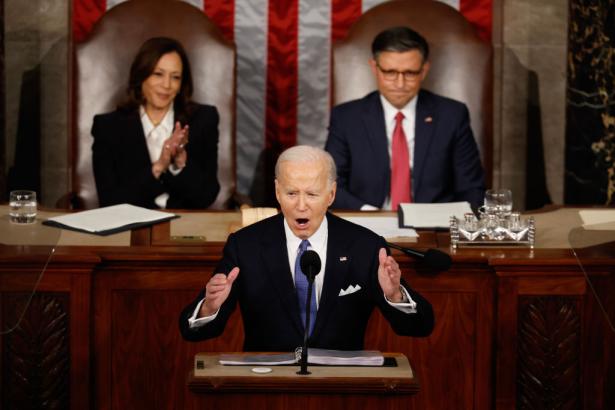Biden delivered his fourth State of the Union address in a chamber where, just four years ago, police were fending off violent mobs seeking to overturn his election and lawmakers were running for their lives.
Against that backdrop, Biden sought to portray himself as a defender of democracy while also touting his economic accomplishments. At the same time, he tried to walk a fine line on his support for Israel’s war in Gaza and more militarized border enforcement, both of which are opposed by much of his progressive base.
Significantly, Biden proclaimed that “the days of trickle-down economics are over” and took credit for a dramatic safety net expansion that kept the U.S. from falling into a post-COVID recession. Biden also pointed to his unprecedented investments in infrastructure and clean energy, crucial investments in manufacturing, and critical domestic programs that so many American families rely on.
These investments have been successful. They’ve helped create over 14 million jobs and the lowest unemployment rate in 50 years, with a historic rise in real wages. Inflation in the U.S. is far lower than in Germany, the United Kingdom, and France and is coming down faster — even though corporations continue to price gouge, keeping many consumer prices higher than before the pandemic.
Other prices are set to come down.
Medicare is now able to negotiate lower prices for certain high-cost drugs, the cost of insulin is capped at $35, and the out-of-pocket cost for prescription drugs for seniors is capped at $2,000. Biden announced he wants to cap drug prices for everyone. He’s also eliminated or capped “junk fees” that result in extra charges on things like late credit card payments and overdraft charges. This policy will save Americans an estimated over $10 billion per year.
A more bittersweet pandemic program success story is the expanded Child Tax Credit, which Biden pointed out had cut child poverty in half and put extra money into the pockets of 40 million families before it expired.
Biden called on lawmakers to bring that expansion pass and to increase the Earned Income Tax Credit for low-income workers without dependent children, which would provide 19 million working Americans an average reduction of about $800 in federal taxes per year. He also wants to expand the Affordable Care Act’s premium tax credit to save millions of people another $800 per year on average.
Looking ahead, Biden called for Congress to pass funding for more rental and mortgage assistance for first-time homeowners, more affordable housing, paid family leave, better child and elder care, and to protect Social Security and Medicare.
When it comes to funding these investments, Biden explicitly drew a contrast with Republicans over President Trump’s $2 trillion tax cuts, which chiefly benefited corporations and the wealthy. Biden laid out an agenda for tax fairness targeted instead at families making less than $400,000 annually, which would require the uber-wealthy and large corporations to pay their fair share.
In particular, he called to increase the corporate tax rate from its current 21 percent to 28 percent, to raise the corporate minimum rate from 15 percent to 21 percent, and to pass a minimum tax of 25 percent on billionaires (who currently pay an average of just 8 percent.) He’s also proposing quadrupling the big corporate stock buyback surcharge, ending loopholes for corporate jets, and denying tax breaks to companies who pay more than $1 million to employees.
Attending other popular progressive priorities, Biden vowed to protect abortion rights and LGBTQ rights, expand voting rights, bolster support for organized labor, and fight climate change.
But on other issues, he was markedly out of step with his base.
Instead of calling for a permanent ceasefire in Israel’s war in Gaza, which the International Court of Justice has identified as possible genocide, Biden merely called for a six-week pause. Biden also announced plans for a temporary pier to deliver humanitarian aid to Gaza and called on Israel to allow more assistance. But he announced no plans to suspend weapons sales or restore funding for Gaza’s largest aid organization, which Biden’s own administration cut earlier this year.
Biden also called on Republicans to pass a bipartisan border bill that contains many provisions backed by hardline immigration opponents. Instead, he needs to strongly support immigrants and a safe, fair, and effective asylum-seeking process at our southern border.
Doing otherwise would be at odds with Biden’s own plans for the economy. The Congressional Budget Office predicts that restricting immigration would cost the U.S. economy $7 trillion in the next 10 years, while 68 percent of Americans believe that immigration is good for the country.
On economics, Biden seemed to succeed in drawing a strong contrast with his conservative opponents. But against a backdrop of democracy under threat, much could depend on drawing a stronger contrast on Gaza and the border.
Karen Dolan directs the Criminalization of Race and Poverty Project at the Institute for Policy Studies.
The Institute for Policy Studies (IPS) is a progressive organization dedicated to building a more equitable, ecologically sustainable, and peaceful society. In partnership with dynamic social movements, we turn transformative policy ideas into action.


Spread the word